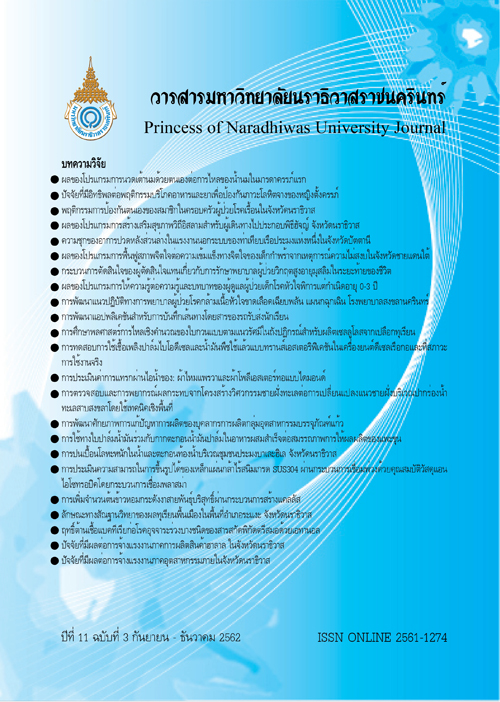The Effect of Mental Health Rehabilitation Program on Resilience of Orphans from the Unrest Situation in Southern Thailand
Keywords:
The Mental Health Rehabilitation Program, Resilience, OrphansAbstract
This quasi-experimental study aimed to examine the effects of a mental health rehabilitation program on resilience in orphans from the unrest situation in Southern Thailand. Purposive sampling was used to select 60 orphans aged between 12 and 18 years who were studying in high schools in the academic year 2017, whose hometown was Muang district of Pattani province, and who had suffer from the unrest situation in Southern Thailand. Thirty orphans were randomly assigned to the experimental group and thirty to the control group. The research instruments included: 1) a general information questionnaire, 2) the mental health rehabilitation program, consisting of four sessions lasting 60– 90 minutes each, and provided once a week, and 3) the resilience questionnaire, which was examined for content validity by three experts and yielded the reliability with a Cronbach’s alpha of .88. Data were analyzed using frequency, percentage, mean, standard deviation, chi-square, paired t-testand independent t-test.
The results showed thatafter attending the mental health rehabilitation program, the experimental
group had a significantly higher mean score of resilience (.05 level) than before. Therefore, it is ecommended
that health personnel or healing team uses the program to increase resilience among orphans from the unrest situation in Southern Thailand.
References
Barker, P. (2001). The Tidal Model: developing and empowering, person-centred approach to recovery with in psychiatric and mental health nursing. Journal of Psychiatric and Mental Health Nursing,8, 233-240.
Barker, P. (2005). The Tidal Model: a guide for mental health professionals. New York: Taylor & Francis e-Library.
Furiya, B., Vineekarn, K. & Thanomsri, I. (2015). The results of the grant program customer-centered group counseling with the use of art on the stress of orphans from the unrest situation in the south. Princess of Narathiwat University Journal, 7(1), 15-24.
Grotberg, H. (1995). A guide for promoting resilience in children: Strengthening the human spirit. The Hague: The Bernard van Leer Foundation. Available from http//ressilnet.uiuc/library/rotb95.html.
Juthamas, S., Vineekarn, K.& Wandee, S. (2016). The results of the program group learning in the management of mental crisis on mental health of adolescents affected by the unrest situation in the south. Songkla Nursing Journal, 36(3), 131-149.
Kanoknuan, K. & Chanittha, C. (2014). The quality of life development for orphans affected from incidents of unrest. Journal Parichart, Thaksin University, 27(2), 65-81.
Marini, S. (2008). Psychological problems and psychological self-care in those who lost family members from Southern unrest situation: a case study of Kapho District, Pattani Province. Nursing Science Master of Nursing Science (Psychiatric Nursing and Mental Health), Faculty of Nursing Prince of Songkla University, Songkhla. (in Thai)
Pattani Social Development and Human Security Office. (2017). Information on orphans received The impact
of the unrest situation in the southern border provinces in Pattani Province. Search from http:// www.pattani.m-society.go.th/
Pimpaporn, K. (2012). Mental health promotion for all ages. Khon Kaen: Warehouse Printing numerous.Southern border event database. (2015). The situation of children in the southern border provinces: 11 years of children andYouth in the Whirlpool of Violence. Search from http://www.deepsouthwatch.org/ms/ node/6656
Southern border event database. (2016). Statistics of the southern border events in 2016. Search from http: // www.deepsouthwatch.org/ms/node/10008
Southern News Center. (2016). Orphaned 6,000 person, 2,800 widowed women who had time to end the violence on the southern border. Search from https://www.isranews.org/content-page/ 67-south-slide/34676-orphan
Sriruean, K. (2010). Life psychology for all ages (Type 9). Bangkok: Thammasat University Press.
Twida, K. (2011). Local Disaster Management Guide. Bangkok: Plain Place. (in Thai)
Ursano, J. & Fullerton, S. (2007). Textbook of disaster psychiatry. New York: Cambridge University Press
Vineekarn, K. & Petdaw, T. (2017). Mental health crisis and “child” care in the situation Violence in the southern border provinces. In Niran Sumalee and Muthita Warirat (Editor), Long Lae ... Research in PSU.(9), 180-189. Bangkok: OS Printing House. (in Thai).
Watcharin,K., Wannee, D. & Chintana, W. (2011). Relationship between traditionsFamily, family bonding and mental strength of teenagers Phra Nakhon Si Ayutthaya Province. Public Health Journal, Burapha University, 6(2), 59-68.




